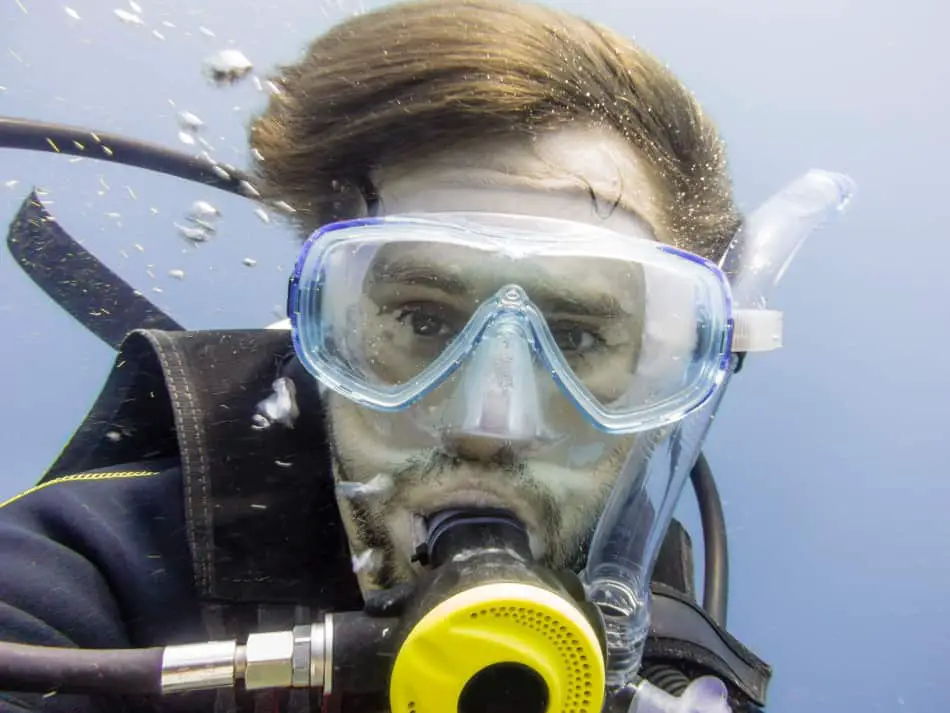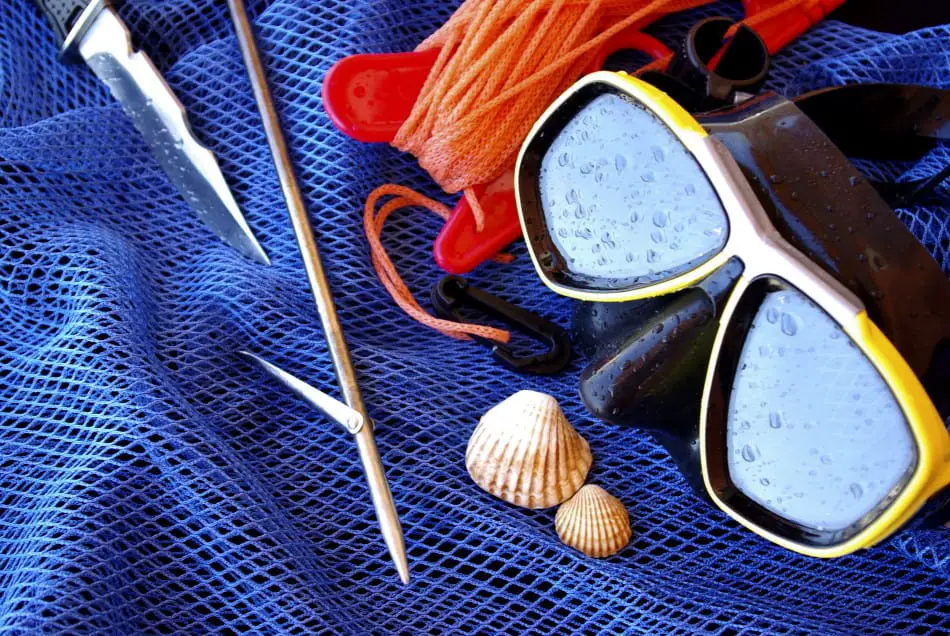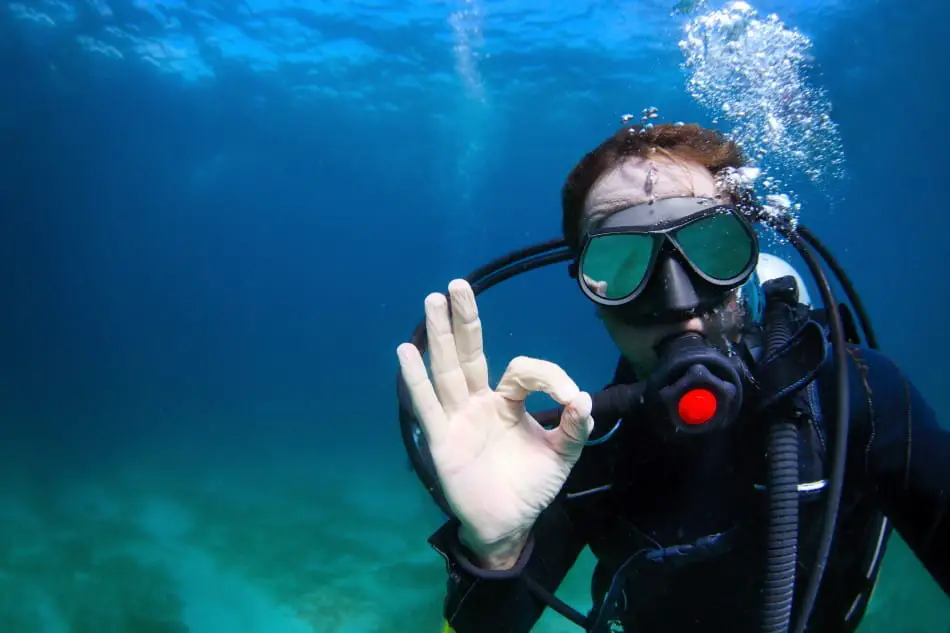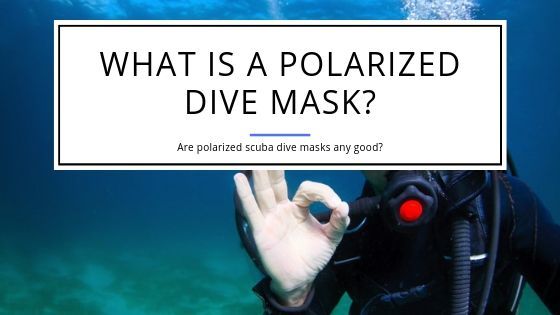What is a Polarized Dive Mask?
A dive mask is an essential component of any scuba diver’s gear. Apart from keeping the diver from inhaling salty water, it also allows them to clearly focus on the water and everything in it.
Every now and then, new types of dive masks are manufactured to help the diver see better and feel more comfortable in the water. One such type is scuba diving masks with polarized lenses. We’re shedding some light on what a polarized dive mask is in the article below.
Which brings us to the question: would polarized dive masks increase the clarity of vision underwater?
What is a Polarized Lens?
Before we look into what a polarized dive mask is, let’s start off with what the purpose of a polarized lens even is:
Polarized lenses work by reducing the glare of the sun (which causes light to reflect off surfaces, such as cars or water). Glare can reduce a person’s visibility, so many people opt for polarized sunglasses, especially when driving to avoid this problem.
In fact, many people use polarized lenses when fishing to be able to see under the water surface.
What is a Polarized Dive Mask?
Since a polarized mask reduces glare and allows those who are fishing, etc., to be able to see underwater, it seems only fitting that a polarized dive mask improves a diver’s vision underwater.
But how exactly does a polarized dive mask work?
Does it Help to See Better Underwater?
Research indicates that water molecules are formed in such a way that the light that enters the water is already partially polarized. A polarized mask further helps divers see better underwater.
In fact, “anti-glare” masks have started gaining some popularity among divers nowadays. These masks not only make everything appear to be brighter and more vibrant underwater, but they also provide a wide field of vision for the scuba diver.
Having said that, the vision on a mask is greatly impacted by whether you have a single lens or multiple lenses, your silicone skirt is clear, and whether your lenses are close to your eyes as is typical for low-volume masks. A polarized mask will not overcome those basic principles by just being polarized!
On average, around 10% of light is reflected (aka lost) by regular dive masks. Anti-glare masks have properties that increase light transmission to around 98%. They reduce the strain on the diver’s eyes, which becomes a great advantage for frequent and professional divers.
What you need to know when you want to find the Best Full Face Dive Mask

Find information and recommendations to find the best prescription scuba mask!
Should You Use a Polarized Dive Mask for Scuba?
Polarized dive masks may add around USD 50 or more to the standard cost of a scuba mask, but is it worth the additional expense? Many divers feel that the protective coating on polarized masks is a gimmick, which just makes the lens a little tinted without doing anything to reduce glare.
Just to be clear, polarized scuba masks are typically the same as any traditional mask. You won’t magically resolve any issues with having a single lens instead of two, needing prescription lenses instead of not having them, getting a better sealing silicone skirt or not, having a more accessible nose pocket, or having a low-volume mask vs a bulky one.
However, getting a polarized mask from a well-reputed brand and one that has received positive reviews from other divers is a good idea. Such masks are likely to be helpful, particularly for specific types of dives:
Can You Use a Polarized Mask for Night Snorkeling or Scuba Diving?
In certain conditions, a polarized mask becomes necessary. This includes night-time dives, diving in water with lower visibility than normal, and also for underwater photographers who need to capture the right shot.
Should You Use a Polarized Snorkel Mask?
Although some divers are suspicious of polarized dive masks, polarized snorkel masks have considerably greater benefits. Snorkelers may go a few feet into the water, but they generally return to the surface within a few moments and observe life under the ocean at the surface. Beginners may be hesitant to completely submerge themselves in the water and may only look into the water facedown.
Polarized masks reduce glare and allow snorkelers to see deeper into the water with more clarity. Snorkelers (Do you need to know swimming for snorkeling?) may be able to observe more sea creatures and corals without having to deal with the light reflecting off the surface of the water, making the entire experience more enjoyable for them.

When Not to Use a Polarized Dive Mask?
Since water is already partially polarized, science indicates that tilting your head sideways in the water would greatly obstruct your vision. This is because the lens will polarize light entering the water vertically, which means a diver may be exposed to pitch darkness if they turn their head the wrong way.
For this reason, polarized dive masks have not really gained much popularity and are rarely talked about by professional divers and dive instructors. While they offer certain benefits (such as a clearer view and a greater field of vision) for snorkelers, they don’t offer anything much of value underwater.
Does a Polarized Mask Prevent Fogging?
Polarized masks do not have magical anti-fog properties and need to be de-fogged before your dive to avoid issues later on. Just follow the same method you would use for a regular dive mask (such as using toothpaste), but you’ll have to be a bit more careful to avoid scraping the coating.
DIY Polarized Masks
Although it’s unlikely that you will find renowned brands supplying polarized dive masks, you can buy polarizing sheets and insert them on top of the lens in your dive mask. Polarized dive filter lenses can also be bought online and from a select few dive stores.
One important factor to remember with this additional coating is that the mask becomes more prone to damage. The coating may easily get scratched during your dive (or snorkel) or as you clean your mask if you’re not careful enough.
Over time, the coating may start peeling on its own. This coating may also leave minor scratches on the actual lens of your mask.
Cameras with Polarizing Properties
Research is being conducted on introducing polarizing properties to underwater cameras to get clearer, sharper images underwater. The concept of attaching a polarizer to the camera has also surfaced and some research has been conducted on it, but nothing concrete has come of it as yet.
However, such ideas are still in the testing phase and divers are still able to capture amazing views of the ocean with their standard underwater cameras.

Final Thoughts
It appears that there’s a very good reason why companies haven’t jumped on board the trend of polarized dive masks – their benefits are minimal. While polarized snorkel masks may still serve a purpose, the polarizing properties of the lens become nearly redundant underwater. The additional expense and sensitivity of the polarized mask make it more of a liability than an asset.
Scuba divers are better off with standard dive masks. As long as the proper maintenance measures are taken and the mask doesn’t fog up underwater, you will be able to see clearly under the water and make the most of your dive.

